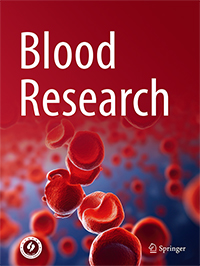Case Report
Korean J Hematol 2009; 44(4):
Published online December 30, 2009
https://doi.org/10.5045/kjh.2009.44.4.278
© The Korean Society of Hematology
동종 조혈모세포이식 후 속발된 호지킨림프종유사 이식 후 림프증식질환
이상민 김기향 강명주 최문영 이원식 주영돈
인제대학교 의과대학 부산백병원 내과학교실
Hodgkin's Lymphoma-like Posttransplantation Lymphoproliferative Disorder after Allogeneic Hematopoietic Stem Cell Transplantation
Hematopoietic stem cell transplantation (HSCT) recipients have a risk of post-transplant lymphoproliferative disorder (PTLD), which normally develops in Epstein-Barr virus (EBV) transformed donor B lymphocytes. The incidence of Hodgkin's lymphoma (HL) ranges from 1.8% to 3.4% of PTLD after HSCT. There are no case reports of early onset HL-like PTLD that developed less than one year after HSCT. We encountered a case of early onset PTLD after an unrelated HSCT following reduced-intensity conditioning with cyclophosphamide/fludarabine/thymoglobulin. A 24 year old patient with severe aplastic anemia developed multiple lymphadenopathies at day 95 after HSCT. The excisional biopsy revealed HL-like PTLD, which tested positive to immunohistochemical staining for the EBV. The Ann Arbor stage was IIA. Immunosuppressive agents were discontinued for 2 weeks in order to induce a graft-versus-lymphoma effect without a response. A total 4 cycles of chemotherapy with doxorubicin (adriamycin)/bleomycin/ vinblastine/dacarbazine (ABVD) and radiotherapy (total dosage 3,400 cGy) were then carried out. The response to salvage treatment was complete remission. The patient showed no evidence of the disease at the follow-up performed 32 months after HSCT. (Korean J Hematol 2009;44:278-283.)
Keywords Posttransplant lymphoproliferative disorder, Hodgkin's lymphoma, Hematopoietic stem cell transplantation
Article
Case Report
Korean J Hematol 2009; 44(4): 278-283
Published online December 30, 2009 https://doi.org/10.5045/kjh.2009.44.4.278
Copyright © The Korean Society of Hematology.
동종 조혈모세포이식 후 속발된 호지킨림프종유사 이식 후 림프증식질환
이상민 김기향 강명주 최문영 이원식 주영돈
인제대학교 의과대학 부산백병원 내과학교실
Hodgkin's Lymphoma-like Posttransplantation Lymphoproliferative Disorder after Allogeneic Hematopoietic Stem Cell Transplantation
Sang Min Lee, Ki Hyang Kim, Myung Joo Kang, Moon Young Choi, Won Sik Lee, Young Don Joo
Department of Internal Medicine, Busan Paik Hospital, Inje University College of Medicine, Busan, Korea
Abstract
Hematopoietic stem cell transplantation (HSCT) recipients have a risk of post-transplant lymphoproliferative disorder (PTLD), which normally develops in Epstein-Barr virus (EBV) transformed donor B lymphocytes. The incidence of Hodgkin's lymphoma (HL) ranges from 1.8% to 3.4% of PTLD after HSCT. There are no case reports of early onset HL-like PTLD that developed less than one year after HSCT. We encountered a case of early onset PTLD after an unrelated HSCT following reduced-intensity conditioning with cyclophosphamide/fludarabine/thymoglobulin. A 24 year old patient with severe aplastic anemia developed multiple lymphadenopathies at day 95 after HSCT. The excisional biopsy revealed HL-like PTLD, which tested positive to immunohistochemical staining for the EBV. The Ann Arbor stage was IIA. Immunosuppressive agents were discontinued for 2 weeks in order to induce a graft-versus-lymphoma effect without a response. A total 4 cycles of chemotherapy with doxorubicin (adriamycin)/bleomycin/ vinblastine/dacarbazine (ABVD) and radiotherapy (total dosage 3,400 cGy) were then carried out. The response to salvage treatment was complete remission. The patient showed no evidence of the disease at the follow-up performed 32 months after HSCT. (Korean J Hematol 2009;44:278-283.)
Keywords: Posttransplant lymphoproliferative disorder, Hodgkin's lymphoma, Hematopoietic stem cell transplantation

Article Tools
Stats or Metrics
Related articles in BR
-
Transfusion support in hematopoietic stem cell transplantation
Dong Wook Jekarl, Jae Kwon Kim, Jay Ho Han, Howon Lee, Jaeeun Yoo, Jihyang Lim, Yonggoo Kim
Blood Res 2023; 58(S1): S1-S7 -
Prognostic impact of total body irradiation dose in pediatric acute lymphoblastic leukemia patients treated with allogeneic hematopoietic stem cell transplantation in second complete remission
Wonjin Jang, Suejung Jo, Jae Won Yoo, Seongkoo Kim, Jae Wook Lee, Pil-Sang Jang, Nack-Gyun Chung, Bin Cho
Blood Res 2022; 57(4): 256-263 -
Reduced-intensity conditioning versus myeloablative conditioning allogeneic stem cell transplantation for patients with myelofibrosis
Dong Hyun Kim, Jeongmin Seo, Dong-Yeop Shin, Youngil Koh, Junshik Hong, Inho Kim, Sung-Soo Yoon, Ja Min Byun
Blood Res 2022; 57(4): 264-271




 PDF
PDF Standard view
Standard view Export citation
Export citation Share
Share  Previous Article
Previous Article



